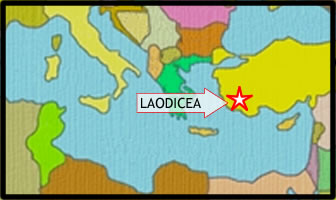[an error occurred while processing this directive]

The Synod
of Laodicea
343-383 AD |
"The Gospels are to be read on the Sabbath [i.e. Saturday], with the other Scriptures" (Synod of Laodicea, Canon 16).
This particular decision of the bishops who gathered at Laodicea is remarkable because it tells us that Christians continued to worship on the seventh-day Sabbath long after 321 AD, when Constantine issued his Sunday law.
Here is canon 29 of that same synod: “Christians must not judaize by resting on the Sabbath, but must work on that day, rather honouring the Lord’s Day; and, if they can, resting then as Christians. But if any shall be found to be judaizers, let them be anathema from Christ.”
The synod recognized that many Christians were still observing the Sabbath by judaizing—that is, by refraining from labor as the Jews did. The bishops condemned the practice and urged church members to do their resting on Sunday instead.
The mere fact that the bishops at Laodicea felt it necessary to address this issue is additional proof that more than 300 years after Christ, many Christians still observed the Sabbath according to the fourth commandment.
[an error occurred while processing this directive]
